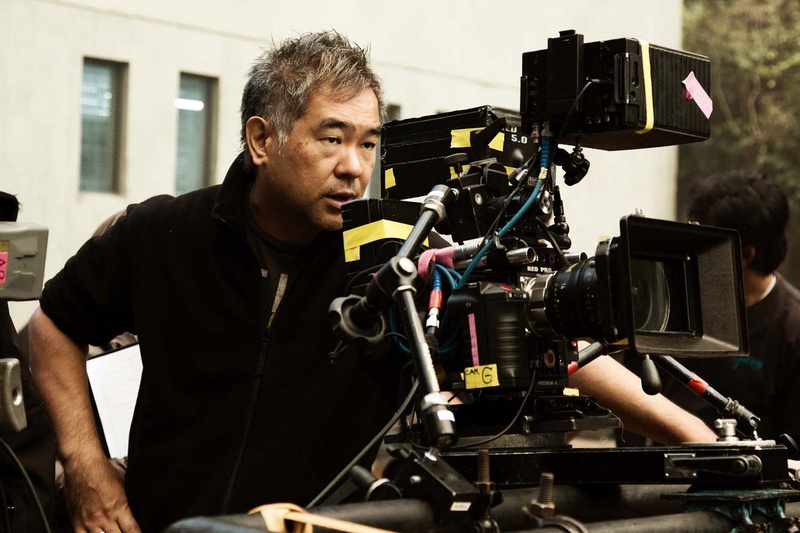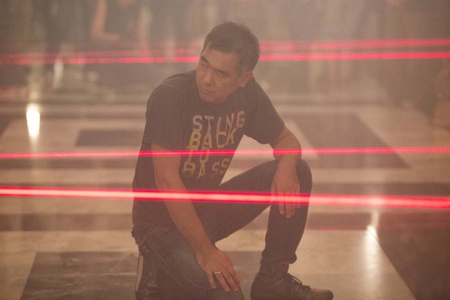The sealed first work
His first Hollywood film was "Midnight Meat Train." Kitamura himself cast Bradley Cooper, who was still unknown at the time, in the lead role. However, this film, which the distributor Lionsgate had high hopes for, was "eliminated," in Kitamura's words, after an unexpected coup. The company's top management changed, and the new head decided to cancel the nationwide release of films made by the old management.
It was originally planned to be released in 3,000 cinemas. If it had been a success, he could have worked on an even bigger blockbuster next. However, that did not happen, and unfortunately, the Writers Guild of America strike broke out at the same time. Furthermore, the Lehman Shock had an impact, and Hollywood came to a standstill from 2008 to 2010. Kitamura thought that he went to the US at a bad time, but he recalls, "I did not want to return to Japan at all." "It wasn't my fault. It wasn't that I was criticized harshly. It's just that the competition I was supposed to participate in was canceled. But, although it was not my fault, a loss is a loss. You shouldn't blame the environment. I thought that the reason why I was not able to overcome such adversity and get a large-scale release (of the work) was because I did not have enough power."
Although "coups" are rarely seen in Japan, Kitamura says that they are "fairly common" in Hollywood. It took three years for Kitamura to recover from his slump. During that time, he had many encounters. Academy Award-winning director Kevin Costner and actor Al Pacino invited him to his home to talk about movies. Once, he answered a phone call from an unknown number and found that the caller was Nicolas Cage. Cage said to Kitamura, "I'm a big fan of you," to which Kitamura immediately replied, "I am a big fan of you."
Through these encounters, Kitamura became convinced that there were people who would see and appreciate his work. And then something even more exciting happened. Bradley Cooper, who starred in the film that was cut, never made it to the public's attention with Kitamura's work, but after the huge success of "The Hangover," he rose to stardom in less than three years. In 2012, he was nominated for the Academy Award for Best Actor for "Silver Linings Playbook." Before he was nominated, when the film was a hot topic in the industry, people strongly recommended that Kitamura "see that film." Some even said, "If you take the script to Cooper now, you can easily raise funds for production, and that's what you should do." However, Kitamura rebuffed them, saying, "That's something I'll do after I catch up with Bradley in Hollywood. I don't want to be a parasite like that right now."
Kitamura says he considers himself clumsy. For three years, he didn't contact Cooper. But then he finally saw Cooper's critically acclaimed film, "The Playbook." "There's a scene where Bradley and Jennifer Lawrence go on a date and have a huge fight. At that time, the movie playing in the background of the movie theater was, of all things, 'Midnight Meat Train.'"
How moved Kitamura must have been when he saw it. And on the day Cooper was nominated for an Academy Award, he texted him, "So proud of you." A minute and a half later, he received a reply. "I'm going to Japan, would you like to come with me?" he asked. "He's not only a great actor, but also a great person," said Kitamura. Cooper's casual reference to Kitamura's work in his own film, and his quick response despite it being three years since they last met, must have given Kitamura, who was coming out of a slump, a lot of courage.
I want to embrace Japanese talent
Furthermore, with the opportunity to interact with Mexican director Guillermo del Toro, whom he admired, Kitamura developed a new project and rebuilt the foundation he had lost in his first Hollywood film. At that time, he was called back from Japan. It was a live-action version of "Lupin III." "Lupin III" has absolute support as an anime work. There are as many images of "Lupin III" as there are fans. It was also said that it would be more difficult to make a movie than "Godzilla." However, Kitamura thought that this was all the more worth the challenge. His switch as a film director was flipped. The production of this film took two years from scriptwriting to release. The VFX and action were handled by a Korean team. "The quality of Korean films is comparable to Hollywood. The Korean team was proactive in addressing the vision I presented to them. They have that kind of positive and creative passion."
"Lupin the Third" was a huge hit. "I felt very comfortable in Japan after seven years. Lupin the Third was my first film in Japan in a long time, and people said a lot of negative things about it, like it was bound to fail, but it turned out to be a huge hit. All my hard work was worth it. But three days after it was released, I came back to Los Angeles. I couldn't stay in my comfort zone. Hollywood, where I'm taking my chances, is a place where incredible talent gathers from all over the world. If I'm away for a while, I'll be forgotten. I can't leave the battlefield."
When asked where he'll be in five years, he replied, "I'll probably be doing whatever I want. It's only going to get better. Whether it's a small movie or a big movie, I'll probably be doing only what I want to do." And after he has established a foothold in Hollywood, he dreams of accepting actors and other talents from Japan and making movies together in America.
A Japanese boy who decided to become a film director after watching Hollywood movies such as "Rocky" and "Alien" made his dream come true in Hollywood 30 years later. He found his place at the end of a corner where nothing was promised.
Ryuhei Kitamura Official Website: http://www.ryuheikitamura.com/
© 2016 Keiko Fukuda







